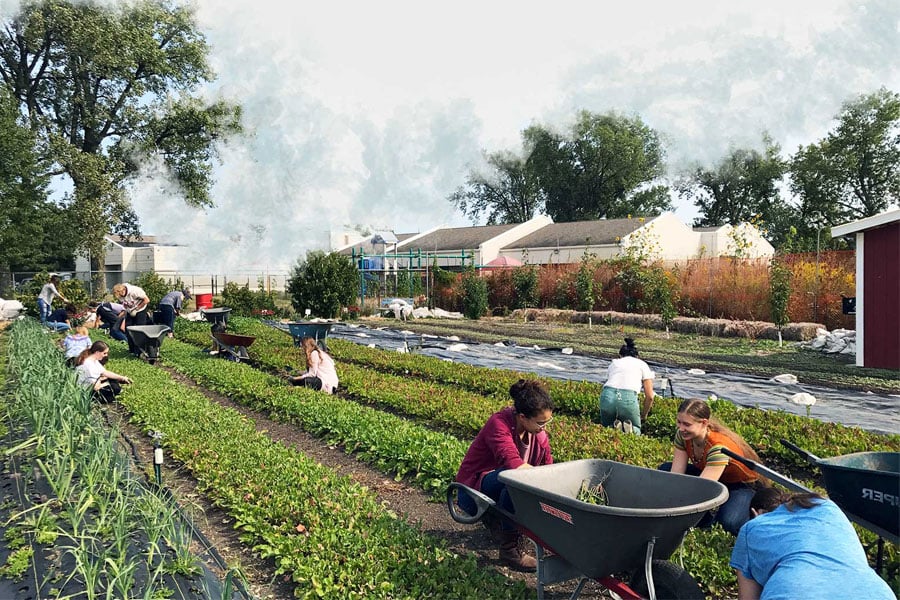The Talking Farm educates community, provides produce for local businesses
Photo courtesy The Talking Farm
The Talking Farm. After being granted Skokie’s first zoning designation for urban agriculture in 2014, the farm grows produce and creates educational programs for the local community.
November 26, 2019
The Talking Farm, located on Howard Street, sits on a two-and-a-half acre plot of land and features rows of planted produce. After being granted Skokie’s first zoning designation for urban agriculture in 2014, the farm strives to feed and sustain its local community by growing produce and creating educational programs.
Farm Manager Matt Ryan helped advance the infrastructure and development work involved with receiving City Council’s approval. He joined the farm to engage with the sustainability and social justice components associated with urban agriculture projects. For him, such efforts includes combating health-related issues, such as diabetes and obesity, lack of access to fresh food, food deserts and workers’ rights.
“It’s big enough to make you feel like you’re addressing five different things in society all at once,” Ryan said.
Increasingly, urban agriculture projects are popping up in cities across the country. They range from small community gardens to commercial urban gardens. Their objectives vary: some seek to provide educational opportunities to youth, while some are more profit-oriented in selling produce to local restaurants and farmers markets. The Chicago Urban Agriculture Mapping Project has mapped 853 sites in the city.
Northwestern junior Caroline Webster interned with the farm through the University’s Chicago Field Studies program last quarter.
“People are so surprised when I tell them I work on a farm in Skokie, which is fifteen minutes away from Northwestern,” Webster said. “They have no idea that all of this is here.”
She said urban farming allows people in cities to see what agriculture “really looks like,” where their food is coming from and why it’s important to eat healthy vegetables, sourced locally and organically.
Webster was drawn to the farm by the possibility of interacting with the community, exposing residents to what it means to be eating locally and how it can be implemented. She said local farming is important because large, commercial farms producing on large scales limits biodiversity and crop rotations, thereby not allowing for a greater diversity of foods in people’s diets.
However, Webster said, urban agriculture is not currently as accessible to lower-income people, who may need such fresh produce the most.
“It’s so important to their health and it’s so important to their livelihoods to be able to have access and to be able to see this is possible,” Webster said. “When they are able to participate in the growing process, it’s especially powerful.”
Learning how to eat healthy starts at a young age, Webster said. She added that kids are the future of urban farming, and urban agriculture educational programs are taking this issue and communicating its importance to young people.
Webster added that kids are the most vulnerable to the effects of dietary restrictions, and not having access to healthy foods or not knowing where your food comes from, can be harmful.
“You have to be able to provide the food, but you also have to be able to tell the kids ‘this is why it’s important,’” Webster said. “Because if they don’t know why it’s important and they don’t know where they can get it, then it’s pointless.”
Backlot Coffee sources produce from the Talking Farm. John Kim, the founder, said the coffee shop gets its root vegetables from the farm, such as carrots and radishes, as well as spring greens coming in at the height of the summer for salads and hummus plates.
When farms can exist in urban areas and educate people, Kim said everyone benefits.
“Whenever you can get things that are both seasonal and local, everyone wins,” Kim said. “As a consumer, they win by getting things that have been in the ground two or three days earlier. Just generally, the local economy does better when we can support educational farms like the Talking Farm… Whenever we can, we like to purchase and buy the things that are available to us within a drive.”
Through sourcing from the farm, Kim said he has been able to understand the challenges of obtaining produce.
For example, when the weather gets very cold, Backlot is not able to get the produce they were scheduled to receive.
“You’re just more rooted to the process,” Kim said. “You get to see how weather affects things… That’s part of the realities of life. When you see the challenges a farm has, you’re that much more thankful for what you can get.”
Although Kim said sourcing food locally is expensive, with a 20 to 30 percent increase in cost for Backlot, he wants to support the Talking Farm’s mission of being an educational and teaching farm.
“We do because it’s part of the vision of what we want to be, where we’re a community coffee house and we know that there are things we can get within the community. It’s a core value of ours to be able to do it, but if it’s not it’s not going to be worthwhile,” Kim said.
Email: [email protected]
Twitter: @cassidyw_












